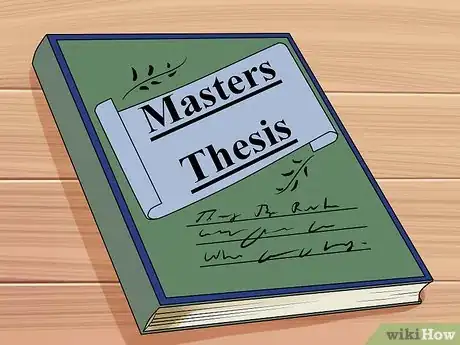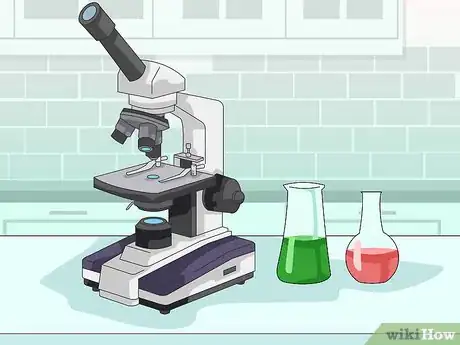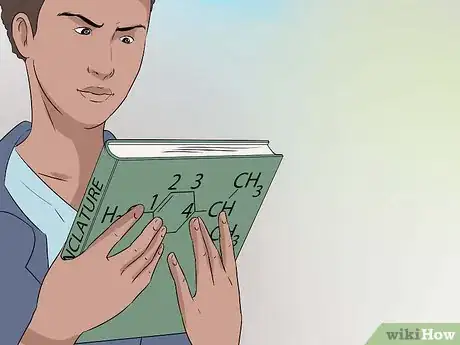This article was co-authored by wikiHow Staff. Our trained team of editors and researchers validate articles for accuracy and comprehensiveness. wikiHow's Content Management Team carefully monitors the work from our editorial staff to ensure that each article is backed by trusted research and meets our high quality standards.
There are 20 references cited in this article, which can be found at the bottom of the page.
This article has been viewed 57,292 times.
Learn more...
Chemistry teachers help future scientists, engineers, and healthcare professionals develop the foundations in chemistry they will need to further their college studies and launch their careers. They also help other students gain an understanding of how the world around them works. If you have the desire to share your love of chemistry with students, becoming a chemistry teacher may be for you.
Steps
Learning Chemistry
-
1Decide that teaching chemistry is right for you. Being a teacher isn’t about learning a subject. It’s about being able to pass along that knowledge to others, many of whom won’t be as interested as you. You need to be able to get excited when explaining chemistry to others. You will need to be a strong communicator to help students understand concepts, and watch them carefully to notice when they may be struggling.[1]
- Other soft skills that will assist you as a chemistry teacher include creative thinking, problem-solving, time management skills, the ability to manage multiple projects at once, and the ability to communicate effectively with students, parents, fellow faculty members, and members of the community.
-
2Study as much math and science as you can in high school. While chemistry is your passion, there is a limit to what you can study in high school. Beef up your background by taking advanced courses in other sciences like physics and biology, as well as advanced math courses like geometry and calculus.[2]Advertisement
-
3Get a bachelor's degree. Since you want to teach chemistry, that subject should probably be your major. Alternatively, you can major in education, but then be sure to minor in chemistry. Depending on the school, you may be able to double major.[3]
- Some schools even offer a specific subfield within the chemistry major for potential educators. These programs will acquaint you with the field’s principles, as well as good ways to relate them to students. If you enter college knowing you want to teach, this may be your best option.[4]
- Not having a chemistry degree is not necessarily a reason you can’t teach the subject. Only about half of the chemistry teachers in the United States majored or minored in the subject.[5] Some states may offer alternative methods to licensing prospective chemistry teachers who have bachelor's degrees in other fields. Check the requirements on the Board of Education website in the state in which you plan to teach for specifics.
-
4Get a master's degree. Most states require an advanced degree to become a public school teacher, so be sure to check the requirements in your state.[6] Even if the state you want to teach in doesn’t require one, this can give you a wider variety of places to potentially work. This degree can be in chemistry or education. In either case, you are demonstrating a greater depth of knowledge, which even schools that do not require will find attractive when hiring.[7]
- There is the additional option of continuing on with your education to receive a doctorate. This is necessary if you want to teach at the college level. In addition, some private schools will like the ability to hire a PhD. If you want to teach at a public school there is no reason to go for the doctorate.
-
5Get some experience in the profession of chemistry. Through high school and college, you should be willing to find ways to get practical chemistry experience. This doesn’t need to be a full-time job, or even paid employment. Experience like this will help keep you connected to the subject when you aren’t in class or lab, and can give you practical exposure to the field. This can be especially useful when explaining the wonders of chemistry to uninterested middle or high school students.
- If you are interested in chemistry while in high school, talk to your chemistry teacher, or other people you know who are chemists or work with chemists. Look for jobs in places that employ chemists, like pharmacies, where you can at least watch chemists work, even if you can’t do much with them directly.
- If you are majoring in chemistry in college, join chemistry clubs and honor societies (like Gamma Sigma Epsilon, Iota Sigma Pi, and Phi Lambda Upsilon), and look for internships during your summers. Practical work experience gained when you are studying the subject will look good when applying for a teaching job.[8]
-
6Get your teaching certification. To teach chemistry in a public middle or high school, you will need a valid teaching certificate for the state in which you plan to teach, and many private schools may require you to have a teacher's license as well. The exact requirements vary from state to state. Generally, the license requires a single-subject certification and classroom experience. Many programs allow you to do these two things simultaneously.[9]
- Some schools will allow you to work towards getting your certification while you start teaching, so long as you do it as soon as you can. This is especially helpful for people who already have a background in practical chemical work, but want to change careers and go into teaching.[10]
- Some states offer reciprocity arrangements with other states where a valid teaching license in one state is automatically honored in other states, while other states require licensed teachers from other states to obtain a new license to teach in their state if they take a teaching position in the new state. Check with the Board of Education of the state in which you plan to obtain your license and any state in which you plan to move to for specifics.[11]
Teaching Chemistry at the College Level
-
1Decide what kind of college you want to work for. There are different kinds of colleges and universities out there, and each will involve you working with different student populations who have specific needs and requirements. In addition, certain schools also have research requirements for you, to make sure you and the institution remain on the cutting edge of chemical work.[12]
- Community College. These are two-year public schools that provide the basis for students to transfer to four-year institutions. You will mostly be teaching introductory level courses, with limited lab work. The school will likely require only a master's degree to teach there, and you will spend most of your time preparing classes and working with students both in and out of class. Most schools will not expect you to do your own research, though the resources may be available if you have the time and desire.
- Predominantly Undergraduate Institution (PUI). These are four-year schools that keep their faculty focused on teaching classes for undergraduates. You will teach both survey-level classes to the general student population and more specific upper-level classes for chemistry majors. If your school has a graduate program, you may teach those classes as well. Schools will expect you to maintain an active research agenda, keeping up with the field and producing new research.
- Research Institution (R1). These are four-year schools that are focused on producing new and cutting edge research. Your primary responsibility will be to work in the lab and publish articles in academic journals that advance the field. You will have teaching responsibilities as well, ranging from introductory surveys to graduate seminars. For teaching, especially surveys, you will likely have teaching assistants, graduate students who can help with grading and other classroom responsibilities.
-
2Get an advanced degree in chemistry. Colleges want to see proof that you have a mastery of the subject material, which means your masters or doctorate needs to be specifically in chemistry, not education. You will need at least a master's degree to teach chemistry to college students, while most four-year institutions require a doctorate.
-
3Build a good relationship with your advisor. Your advisor is not just your instructor, but also a mentor for your career. In addition, he probably has many connections in the field, which you will need for recommendations and getting your foot into the door of many job openings.[13]
-
4Find teaching experience. Most of the work you do in graduate school will be about learning chemistry principles and performing your own research. If you want to be a teacher, though, you need to get classroom experience. This will make you more attractive to a variety of schools, as the most likely jobs you will get will focus on your teaching ability.[14]
- When you are in graduate school, make sure you get experience as a teaching assistant. Your duties will involve grading, leading labs and discussion sections, and holding office hours, all important jobs of an instructor. There are many possible tasks for a graduate assistant, so you may want to make sure you ask your advisor or department to make sure you get in the classroom.
- You can also cover classes as an adjunct. Many schools use temporary faculty to cover classes, especially at an introductory level. Many of these positions don’t require a doctorate, so you can even do those before finishing your doctorate. Call or email schools in your area to see if they have openings, and send out your cv to look for interest.
-
5Create a teaching philosophy. In fields like the hard sciences, college professors tend to be more interested in their research instead of teaching. You will want to be able to explain to a job search committee what draws you to teaching. When you prepare your teaching philosophy, make sure it explains both how you approach teaching, but also what draws you to doing it.[15]
- This teaching philosophy is also a great way to highlight the practical experiences you’ve gained from being a teaching assistant and course instructor. Talk about projects, labs, and assignments that kept students’ attention, and things you learned about students from interacting with them.
-
6Find a job. College-level teaching jobs are difficult to come by, and you will be facing stiff competition. As you search through job advertisements, prepare your application, and face the interview, there are small steps you can take to help increase your chances of success.
- Read the job advertisement carefully to make sure you have all of the proper materials for your application. Each school asks for something different, and will ask for it by a certain date as well. Make sure each application has all of the documentation you need, or else the search committee probably won’t read your materials.[16]
- Tailor your application materials to the school you are applying to. Every school is a little bit different, and will look for different things in their students and faculty. Make sure your materials discuss how you will be a good fit for the school and department.[17] If your advisor knows someone in the department, he will probably have some good advice for things you can say to ingratiate yourself quickly.
- If you get an interview, make sure you are prepared for the big moments, which include explaining your research and interacting with future colleagues. You will be expected to discuss your research, both formally in a job talk, and informally in conversation with other faculty. Make sure you can discuss your work in a compact and coherent way, and that you keep to the time allotted. A job talk should not run over, and informal conversation should be kept to within 5 minutes (the “elevator pitch”). The interview is also a way for the other faculty to see what kind of colleague you will be, so make sure to study their research interests, and ask them about the projects they are working on.[18]
-
7Earn tenure. The ultimate goal for a college professor is to earn tenure, effectively a lifetime appointment to your position. After you spend about six to seven years as an Associate Professor, the school will review your work to see that you are a valued member of the faculty and someone they want to keep around. If you do not earn tenure, your contract will most likely end and you will have to find a new job. Every school’s requirements for tenure are slightly different, but they all involve a combination of productive research, teaching quality, and service to the school and department.[19]
- The importance of each part of the tenure process depends on the school you work for. Community colleges and PUIs put greater emphasis on teaching than R1s, where research is most important. Make sure you know what your school and department wants to emphasize when you start to make sure you spend your time appropriately.
- Because tenure review is done by your peers, it can be helpful to be a good colleague. Remain friendly, help with requests and concerns, and do your best to be someone other faculty will want to work with. Having a good relationship with your co-workers can help you in the process, and bad colleagues may not receive tenure even if they are otherwise productive.
Finding a Job and Continuing Your Education
-
1Decide what kind of school you want to work for. There are a number of different schools in the country, and each type will have certain kinds of students and resources for you to work with. While you can be willing to work in more than one type of school, it can be good to know the differences.[20]
- Public Schools. These are the most common type of school, and will have the largest number of job openings. They are open to all students in a locally governed school district, and subject to regulation by state and federal law. You will have larger classes with a variety of learning types and ability levels. The type of students you get will vary based on a variety of factors such as the school district’s location. Depending on the school, your resources for labs and classroom work may be limited, which can affect the types of labs you have students do. Some public school systems operate charter or magnet schools, which draw students from across the district and have higher standards for work.
- Private Schools. These schools operate separately from the public school system, and generally have their own standards. Many have admissions requirements, so you will probably have smaller classes with better students. These can be governed by private groups, including churches, so you may be subjected to additional rules regarding standards and behavior. Many private schools will want you to have a master's degree, and will like it if you have a doctorate.
-
2Join a professional organization. There are several major professional organizations out there for teachers, such as the Association of American Educators. These groups are great for networking, finding opportunities for continuing education, and learning about new job openings. There are also professional unions such as the National Education Association and American Federation of Teachers, which can be helpful understanding your job rights and responsibilities.[21]
-
3Search for openings. Once you have a sense of the kind of schools you are looking for and where you want to work, start searching for open teaching positions in those areas. Many professional organizations have job boards or other ways of advertising open positions. Find schools that are looking for chemistry teachers and submit your application.[22]
- If you are more restricted geographically in your searching, perhaps for family or personal reasons, you may have be proactive in hunting. Instead of hoping for an open position nearby, contact local school districts and principals to ask what might be available. Be prepared to show your cv and discuss your experiences. Even if they aren’t willing or able to hire you right away, they may be willing to keep your cv on file in case an opening does appear.
-
4Plan out your lessons. Look for the requirements or exams given by your state or school that the students should be prepared for. Otherwise, list out the main concepts you will want your students to understand, and prepare labs to demonstrate those ideas.[23]
- Take into account the resources your school has available. Do not plan labs that involve equipment or chemicals that the school doesn’t have, or at the very least be prepared to acquire them yourself.
-
5Keep up with standards. State standards for student learning are always changing, so you will need to keep a lookout. You not only want your students to understand the basics behind chemistry, but gain the specific knowledge required of them for advancement and graduation.#*This is also important if you teach Advanced Placement or International Baccalaureate level classes to high school students. Those standards should be readily available, and the testing companies are willing to provide additional materials and courses to help teachers prepare their students for the exams.[24]
-
6Continue your education. Just because you have the degree and the job doesn’t mean you can stop learning. You know that chemistry is an ever-changing field, and new tools for student comprehension are being developed all the time. Search for courses in both chemistry and education that will help you keep up with new developments in the field, hone your skills, and network with other teachers to find new and interesting ways to help your students learn. Professional organizations like the American Association of Chemistry Teachers can offer in person and online courses for teachers looking to broaden their knowledge.[25]
- There are a variety of state and federal requirements involving continuing education and professional development in order to maintain your certification. Keep an eye on what you need to do, and make sure you keep up with the standards.
References
- ↑ http://www.sciencebuddies.org/science-engineering-careers/earth-physical-sciences/chemistry-teacher#keyfactsinformation
- ↑ http://www.sciencebuddies.org/science-engineering-careers/earth-physical-sciences/chemistry-teacher#keyfactsinformation
- ↑ http://education-portal.com/articles/Chemistry_Teacher_Job_Info_and_Requirements_for_Becoming_a_High_School_Chemistry_Teacher.html
- ↑ http://www.admissions.purdue.edu/majors/majors_details.php?MjrCd=CHEMED
- ↑ http://www.acs.org/content/acs/en/education/educators/chemistry-teacher-education-coalition.html
- ↑ https://certificationmap.com/how-to-become-a-teacher/
- ↑ http://education-portal.com/articles/How_to_Become_a_High_School_Chemistry_Teacher_Career_Roadmap.html
- ↑ http://www.acs.org/content/acs/en/education/students/college/experienceopp.html
- ↑ http://www.sciencebuddies.org/science-engineering-careers/earth-physical-sciences/chemistry-teacher#education
- ↑ http://www.acs.org/content/acs/en/education/educators/coursesworkshops/certification.html
- ↑ http://teach.com/where/teaching-in-america/teacher-certification-reciprocity
- ↑ http://www.acs.org/content/acs/en/careers/college-to-career/chemistry-careers/chemistry-professor.html
- ↑ http://www.artofmanliness.com/2009/07/08/so-you-want-my-job-college-professor/
- ↑ http://www.sciencemag.org/careers/2013/11/career-college-science-teacher
- ↑ http://www.sciencemag.org/careers/2013/11/career-college-science-teacher
- ↑ http://www.slate.com/articles/life/education/2014/09/how_do_professors_get_hired_the_academic_job_search_explained.html
- ↑ http://www.artofmanliness.com/2009/07/08/so-you-want-my-job-college-professor/
- ↑ https://chroniclevitae.com/news/477-the-professor-is-in-surefire-ways-to-screw-up-your-campus-visit
- ↑ http://www.artofmanliness.com/2009/07/08/so-you-want-my-job-college-professor/
- ↑ http://teach.com/where/types-of-schools
- ↑ http://www.teachercertificationdegrees.com/become/
- ↑ http://www.teachercertificationdegrees.com/become/
- ↑ http://www.sciencebuddies.org/science-engineering-careers/earth-physical-sciences/chemistry-teacher#onthejob
- ↑ https://professionals.collegeboard.com/prof-dev/workshops/sciences/ap-chemistry
- ↑ https://www.teachchemistry.org/content/aact/en/professional-development.html
About This Article
To become a chemistry teacher, focus on taking math and science classes in high school since they'll teach you the skills you need to know. In addition to learned skills, you'll also need to be a great communicator and problem solver, be able to manage time well, get excited about your topic, and think in creative ways to help students understand difficult ideas. If this seems like the right career path for you, then consider getting your Bachelor's degree in chemistry or education to pursue your goals. To learn how to find a job teaching chemistry, keep reading!
































-Step-13.webp)













































